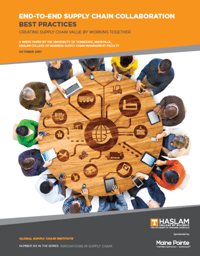Maine Pointe Sponsors UT Global Supply Chain Institute White Paper on Supply Chain Best Practices
Cross-functional collaboration and supply chain integration are challenging business goals that many companies deprioritize because their value is hard to define.
A new study from the University of Tennessee, Knoxville's Global Supply Chain Institute, sponsored by Maine Pointe, finds that not only does internal collaboration create financial worth; benchmark companies are leveraging collaboration outside their organizations to create competitive advantages.
“Companies with the strongest supply chains integrated them from end-to-end long ago and have mastered working across business disciplines,†says Mike Burnette, managing director of the institute and an author of "End-to-End Supply Chain Collaboration Best Practices." “They are now using those skills to work with external supply chain partners and find ways to collaborate with non-competitors to create cost-saving opportunities.â€
Decades spent pursuing cost savings within internal supply chain functions leaves little room for improvement at this point. As complexity and consumer and shareholder expectations increase, CEOs and supply chain professionals must retrain their focus on contributing to strategic initiatives instead of solely on fulfilling demand as cheaply as possible.
The study identifies collaboration as one of six key elements of creating competitive advantages through supply chain, but emphasizes that supply chains must optimize efficiency through reliability, common values, and end-to-end visibility before these advantages can work.
Maine Pointe, the supply chain implementation-focused consulting firm that sponsored the paper, found that driving collaboration excellence across procurement, logistics, and operations yielded a 20 to 30 percent gain in savings for many companies they worked with. Steven Bowen, the firm’s chairman and CEO, says that integrating these functions using their Total Value Optimization™ approach creates breakthrough results in terms of cost, cash, customer service, growth, and profitability.
“If your procurement, operations, and logistics functions aren’t aligned to work together seamlessly to delight your customers while minimizing excess cost and working capital, you may be leaving money on the table,†Bowen says.
Burnette and his fellow supply chain faculty at the Haslam College of Business interviewed 17 leading companies across eight industries to identify common components of collaboration success. They found that collaboration must be emulated by the supply chain leader and that leader must have a solid understanding of all supply chain and other business functions.
Company culture was another key element, with trust between departments and a value of and means to account for inventory, quality, responsiveness, and time making significant impacts. Benchmark companies used these elements to share systems and data, facilitate external partnerships, and achieve the ultimate collaboration opportunity: creating effective sales and operations planning.
"End-to-End Supply Chain Collaboration Best Practices" is the sixth installment of the Global Supply Chain Institute’s Innovations in Supply Chain white paper series. The study provides multiple checklists for collaboration opportunities and maturity assessment tools.
To arrange an interview, please contact our Marketing Communications Director, Stephanie Kimball, at +1 617-842-7992 or skimball@mainepointe.com
About Maine Pointe
Maine Pointe is a global implementation-focused consulting firm trusted by many chief executives and private equity firms to drive compelling economic returns for their companies. We achieve this by delivering accelerated, sustainable, improvements in both EBITDA and cash across their supply chain and operations to enable growth. Our hands-on implementation experts work with executives and their teams to rapidly break through functional silos and transform the buy-make-move-fulfill supply chain to deliver the greatest value to customers and investors at the lowest cost to business. We call this Total Value Optimization (TVO)â„¢.
Maine Pointe’s engagements are results-driven and deliver between 3.5:1-12:1 ROI. We are so confident in our work and our processes that we provide a unique 100% guarantee of engagement fees based on annualized savings. www.mainepointe.com
About the Global Supply Chain Institute
The University of Tennessee’s Global Supply Chain Institute is an internationally recognized thought leader in global supply chain research and the industry’s connection point to the researchers and students of Haslam College of Business’s top-ranked supply chain program. The supply chain program is ranked among the top programs by U.S. News & World Report, Gartner, Business Week, and Supply Chain Management Review.

